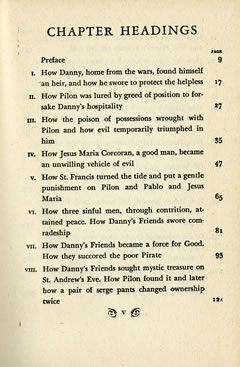Tortilla Flat
You may click on the thumbnail images to view them full screen

Steinbeck, John. Tortilla Flat. New York: Grosset & Dunlap, 1935.
Nobel Prize winning novelist John Steinbeck (1902-1968) had been fascinated by Malory's tale since childhood. As he noted in the Introduction to the Acts of King Arthur, it was a version of Malory designed for youngsters from which he developed 'my sense of right and wrong, my feeling of noblesse oblige, and any thought I may have against the oppressor and for the oppressed.' Thus Malory's Morte helped to shape all of Steinbeck's work, even his novels of social concern.
In Tortilla Flat, Steinbeck translates the Arthurian realm into the modern world by creating an overlay of Arthurian allusion to ennoble the lower-class characters of the novel. Steinbeck himself said in a letter written in 1934 that Tortilla Flat, 'has a very definite theme. I thought it was clear enough. I have expected that the plan of the Arthurian cycle would be recognized, that my Gawaine and my Launcelot, my Arthur and Galahad would be recognized. Even the incident of the Sangreal in the search in the forest is not clear enough I guess. The form is that of the Malory version, the coming of Arthur and the mystic quality of owning a house, the forming of the round table, the adventure of the knights and finally, the mystic translation of Danny [the King Arthur figure in the book].' To make the link more obvious, Steinbeck added chapter headings that imitated those in the Caxton edition of Malory. Steinbeck also added a sentence to the preface to make the Arthurian connection more explicit: 'For Danny's house was not unlike the Round Table, and Danny's friends were not unlike the knights of it.' Danny, who shelters his friends, takes on the role of Arthur in medieval romance by providing a focal point for his followers and a starting point for all their adventures. Danny's companion Pilon, who advises him, is the story's Merlin. Despite the use of the Arthurian material to ennoble his characters, Steinbeck never idealizes or overly romanticizes them—although they do have their own code of ethics and do champion those in distress.